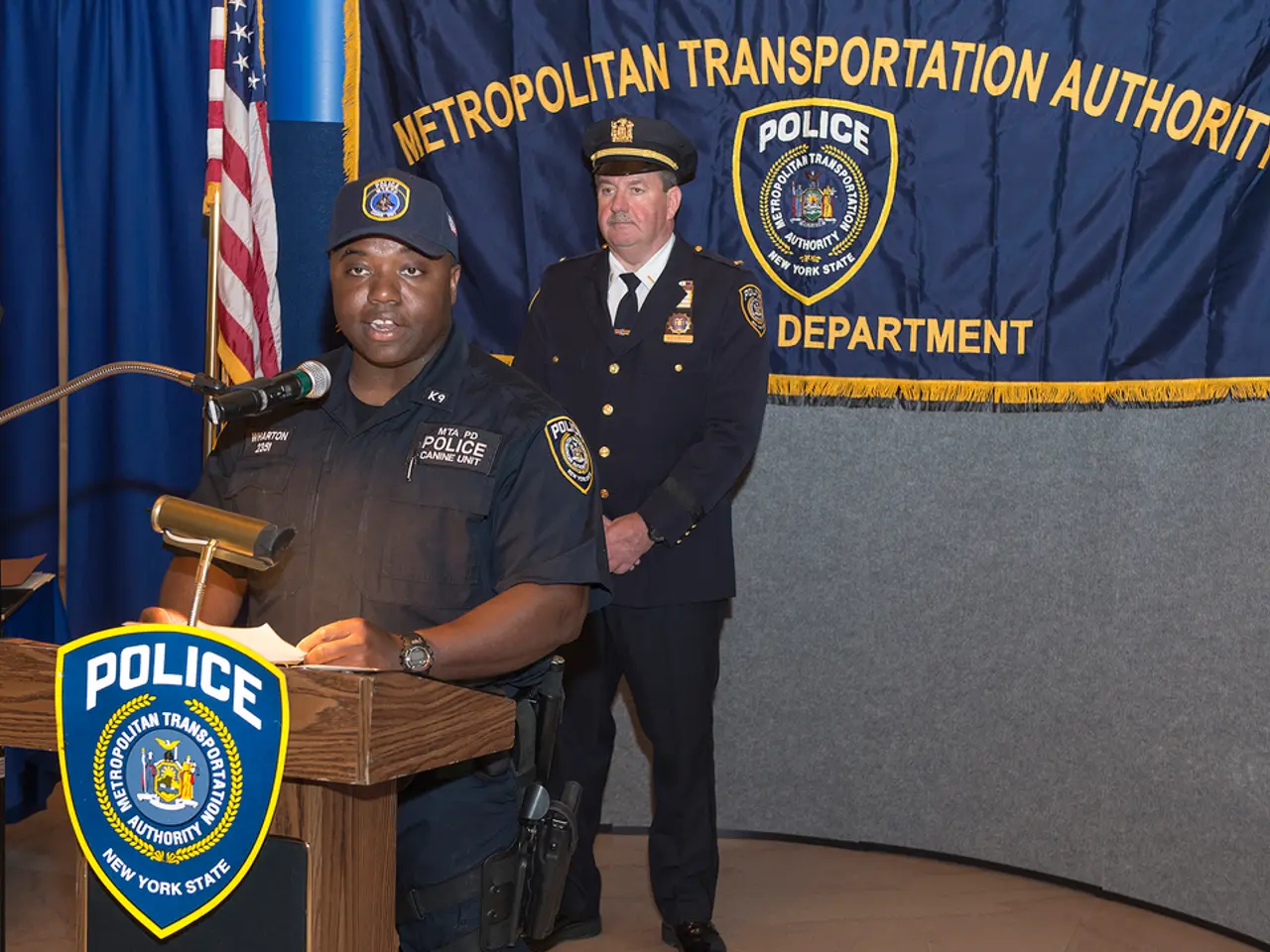Federal agents shifted into uncommon positions due to Trump's dominance in Washington D.C.
Federal Agents Assigned to Patrol Duties in Washington D.C.
Federal agents, including those from the FBI, DEA, and ICE, are being reassigned to patrol duties in Washington D.C., marking a significant shift from their usual investigative roles. This move is part of a broader federal takeover of the city's law enforcement, prompted by claims of high crime levels.
The reassignment involves approximately 500 federal agents, along with about 2,000 National Guard troops. They are conducting neighborhood patrols, checkpoints, traffic stops, and immigration enforcement sweeps to supplement local police efforts. This expanded role sees them engaging in more routine patrol and street-level law enforcement activities [1][2].
The federal administration justifies this move as necessary to address public safety and violent crime. However, local leaders and civil rights advocates criticize it as an overreach and politicized intervention. The increased federal presence in the city streets blurs the lines between specialized federal law enforcement and standard police patrol duties [1][2].
President Donald Trump invoked a provision of the District's Home Rule Act to assume temporary control of the Metropolitan Police Department. This move was supported by the DC Police Union, which cited a need for immediate action to restore public safety [3].
However, city officials dispute the premise that crime in Washington is spiraling out of control. Homicides dropped by more than 20% last year, and violent crime reached a 30-year low, according to the Justice Department [4].
The order includes the activation of 800 National Guard troops and the reassignment of federal agents, including about 130 from the FBI. Some federal agents have been pulled from specialized assignments and placed into unfamiliar field roles [1][2].
There is little clarity on who is directing operations or what the metrics for success will be. Secret Service agents have been deputized to enforce local laws, an expansion of their traditional protective mission and routine patrols near the White House and the Naval Observatory [1].
ATF agents, typically tasked with regulating firearms dealers and investigating gun trafficking, were reassigned to support Immigration and Customs Enforcement [1]. These agents were not instructed to gather intelligence or conduct interviews, even in cases involving individuals suspected of ties to transnational gangs [1].
John Devito, a retired special agent who led the New York office of the ATF, states that federal agents are trained to adapt across different environments and can provide valuable support alongside local police during challenging circumstances [5]. Robert D'Amico, a former FBI hostage rescue team member, emphasizes that patrol work requires a different mentality, learned through field training with a partner who demonstrates proper approach techniques and stance [6].
This move to assign federal agents to patrol duties in Washington is part of a broader expansion of federal enforcement authority under President Trump [7]. It remains to be seen how this shift will impact public safety and the balance of law enforcement responsibilities in the city.
References:
[1] Associated Press. (2020, June 1). Federal agents take on patrol duties in Washington amid protests. The Washington Post. https://www.washingtonpost.com/local/dc-politics/federal-agents-take-on-patrol-duties-in-washington-amid-protests/2020/06/01/e1772c5a-b116-11ea-8e57-978132d84b2c_story.html
[2] Bender, M. (2020, June 2). Federal agents patrol D.C. streets as part of Trump's expanded law enforcement presence. Politico. https://www.politico.com/news/2020/06/02/federal-agents-patrol-d-c-streets-as-part-of-trumps-expanded-law-enforcement-presence-333614
[3] Mufson, L. (2020, June 1). DC police union backs Trump's move to seize control of city operations. The Washington Post. https://www.washingtonpost.com/local/dc-politics/dc-police-union-backs-trumps-move-to-seize-control-of-city-operations/2020/06/01/e6a43f42-b116-11ea-8e57-978132d84b2c_story.html
[4] Mufson, L. (2020, June 1). DC homicides drop more than 20% in 2019, reaching a 30-year low. The Washington Post. https://www.washingtonpost.com/local/dc-politics/dc-homicides-drop-more-than-20-percent-in-2019-reaching-a-30-year-low/2020/06/01/e1772c5a-b116-11ea-8e57-978132d84b2c_story.html
[5] Associated Press. (2020, June 1). Federal agents take on patrol duties in Washington amid protests. The Washington Post. https://www.washingtonpost.com/local/dc-politics/federal-agents-take-on-patrol-duties-in-washington-amid-protests/2020/06/01/e1772c5a-b116-11ea-8e57-978132d84b2c_story.html
[6] Bender, M. (2020, June 2). Federal agents patrol D.C. streets as part of Trump's expanded law enforcement presence. Politico. https://www.politico.com/news/2020/06/02/federal-agents-patrol-d-c-streets-as-part-of-trumps-expanded-law-enforcement-presence-333614
[7] Bender, M. (2020, June 2). Federal agents patrol D.C. streets as part of Trump's expanded law enforcement presence. Politico. https://www.politico.com/news/2020/06/02/federal-agents-patrol-d-c-streets-as-part-of-trumps-expanded-law-enforcement-presence-333614
- The reassignment of federal agents to patrol duties in Washington D.C. raises concerns about the balance of law enforcement responsibilities and its potential impact on policy-and-legislation and politics.
- The increase in federal presence in the city streets, resulting from the reassignment of federal agents for traffic stops and immigration enforcement sweeps, could potentially influence the general-news narrative.
- The engagement of federal agents in crime control and traffic management could divert resources from investigating transnational crimes like war-and-conflicts and organized crime but may improve public safety, as justification suggests.







